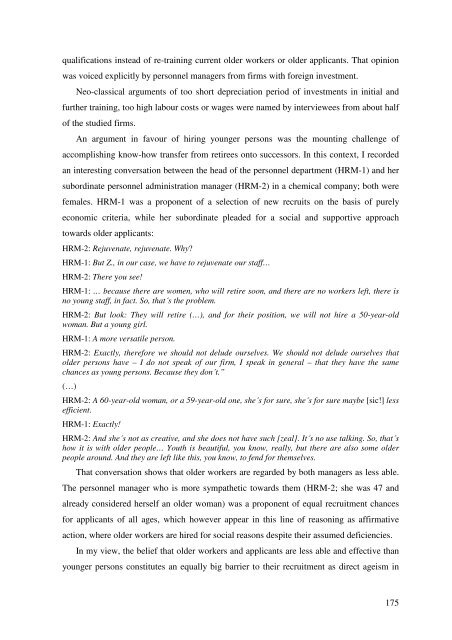Dissertation_Paula Aleksandrowicz_12 ... - Jacobs University
Dissertation_Paula Aleksandrowicz_12 ... - Jacobs University
Dissertation_Paula Aleksandrowicz_12 ... - Jacobs University
Create successful ePaper yourself
Turn your PDF publications into a flip-book with our unique Google optimized e-Paper software.
qualifications instead of re-training current older workers or older applicants. That opinion<br />
was voiced explicitly by personnel managers from firms with foreign investment.<br />
Neo-classical arguments of too short depreciation period of investments in initial and<br />
further training, too high labour costs or wages were named by interviewees from about half<br />
of the studied firms.<br />
An argument in favour of hiring younger persons was the mounting challenge of<br />
accomplishing know-how transfer from retirees onto successors. In this context, I recorded<br />
an interesting conversation between the head of the personnel department (HRM-1) and her<br />
subordinate personnel administration manager (HRM-2) in a chemical company; both were<br />
females. HRM-1 was a proponent of a selection of new recruits on the basis of purely<br />
economic criteria, while her subordinate pleaded for a social and supportive approach<br />
towards older applicants:<br />
HRM-2: Rejuvenate, rejuvenate. Why?<br />
HRM-1: But Z., in our case, we have to rejuvenate our staff…<br />
HRM-2: There you see!<br />
HRM-1: … because there are women, who will retire soon, and there are no workers left, there is<br />
no young staff, in fact. So, that´s the problem.<br />
HRM-2: But look: They will retire (…), and for their position, we will not hire a 50-year-old<br />
woman. But a young girl.<br />
HRM-1: A more versatile person.<br />
HRM-2: Exactly, therefore we should not delude ourselves. We should not delude ourselves that<br />
older persons have – I do not speak of our firm, I speak in general – that they have the same<br />
chances as young persons. Because they don´t.”<br />
(…)<br />
HRM-2: A 60-year-old woman, or a 59-year-old one, she´s for sure, she´s for sure maybe [sic!] less<br />
efficient.<br />
HRM-1: Exactly!<br />
HRM-2: And she´s not as creative, and she does not have such [zeal]. It´s no use talking. So, that´s<br />
how it is with older people… Youth is beautiful, you know, really, but there are also some older<br />
people around. And they are left like this, you know, to fend for themselves.<br />
That conversation shows that older workers are regarded by both managers as less able.<br />
The personnel manager who is more sympathetic towards them (HRM-2; she was 47 and<br />
already considered herself an older woman) was a proponent of equal recruitment chances<br />
for applicants of all ages, which however appear in this line of reasoning as affirmative<br />
action, where older workers are hired for social reasons despite their assumed deficiencies.<br />
In my view, the belief that older workers and applicants are less able and effective than<br />
younger persons constitutes an equally big barrier to their recruitment as direct ageism in<br />
175
















